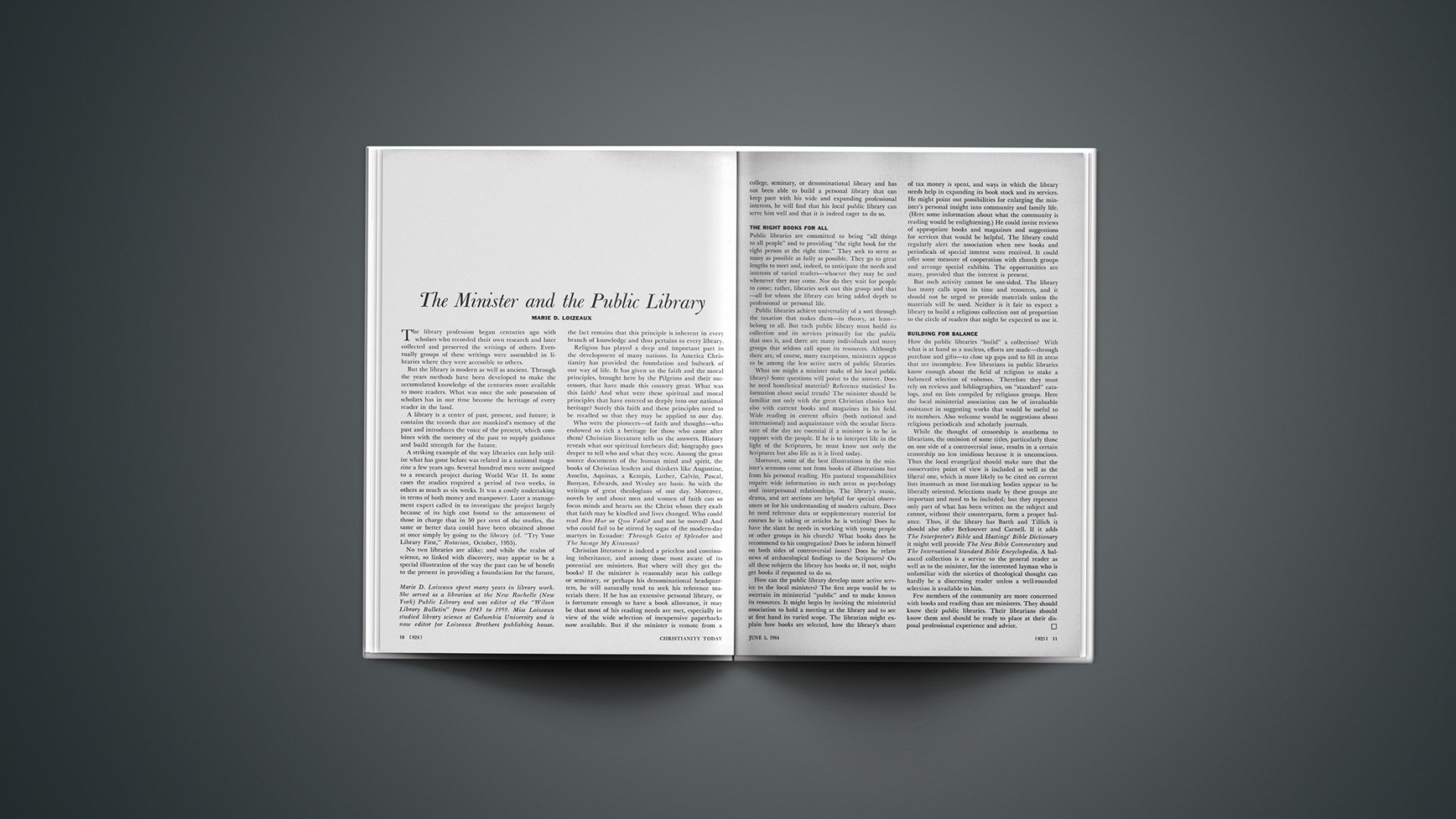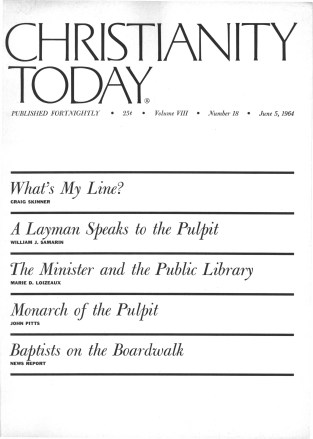The library profession began centuries ago with scholars who recorded their own research and later collected and preserved the writings of others. Eventually groups of these writings were assembled in libraries where they were accessible to others.
But the library is modern as well as ancient. Through the years methods have been developed to make the accumulated knowledge of the centuries more available to more readers. What was once the sole possession of scholars has in our time become the heritage of every reader in the land.
A library is a center of past, present, and future; it contains the records that are mankind’s memory of the past and introduces the voice of the present, which combines with the memory of the past to supply guidance and build strength for the future.
A striking example of the way libraries can help utilize what has gone before was related in a national magazine a few years ago. Several hundred men were assigned to a research project during World War II. In some cases the studies required a period of two weeks, in others as much as six weeks. It was a costly undertaking in terms of both money and manpower. Later a management expert called in to investigate the project largely because of its high cost found to the amazement of those in charge that in 50 per cent of the studies, the same or better data could have been obtained almost at once simply by going to the library (cf. “Try Your Library First,” Rotarian, October, 1955).
No two libraries are alike; and while the realm of science, so linked with discovery, may appear to be a special illustration of the way the past can be of benefit to the present in providing a foundation for the future, the fact remains that this principle is inherent in every branch of knowledge and thus pertains to every library.
Religion has played a deep and important part in the development of many nations. In America Christianity has provided the foundation and bulwark of our way of life. It has given us the faith and the moral principles, brought here by the Pilgrims and their successors, that have made this country great. What was this faith? And what were these spiritual and moral principles that have entered so deeply into our national heritage? Surely this faith and these principles need to be recalled so that they may be applied to our day.
Who were the pioneers—of faith and thought—who endowed so rich a heritage for those who came after them? Christian literature tells us the answers. History reveals what our spiritual forebears did; biography goes deeper to tell who and what they were. Among the great source documents of the human mind and spirit, the books of Christian leaders and thinkers like Augustine, Anselm, Aquinas, a Kempis, Luther, Calvin, Pascal, Bunyan, Edwards, and Wesley are basic. So with the writings of great theologians of our day. Moreover, novels by and about men and women of faith can so focus minds and hearts on the Christ whom they exalt that faith may be kindled and lives changed. Who could read Ben Hur or Quo Vadis? and not be moved? And who could fail to be stirred by sagas of the modern-day martyrs in Ecuador: Through Gates of Splendor and The Savage My Kinsman?
Christian literature is indeed a priceless and continuing inheritance, and among those most aware of its potential are ministers. But where will they get the books? If the minister is reasonably near his college or seminary, or perhaps his denominational headquarters, he will naturally tend to seek his reference materials there. If he has an extensive personal library, or is fortunate enough to have a book allowance, it may be that most of his reading needs are met, especially in view of the wide selection of inexpensive paperbacks now available. But if the minister is remote from a college, seminary, or denominational library and has not been able to build a personal library that can keep pace with his wide and expanding professional interests, he will find that his local public library can serve him well and that it is indeed eager to do so.
The Right Books For All
Public libraries are committed to being “all things to all people” and to providing “the right book for the right person at the right time.” They seek to serve as many as possible as fully as possible. They go to great lengths to meet and, indeed, to anticipate the needs and interests of varied readers—whoever they may be and whenever they may come. Nor do they wait for people to come; rather, libraries seek out this group and that—all for whom the library can bring added depth to professional or personal life.
Public libraries achieve universality of a sort through the taxation that makes them—in theory, at least—belong to all. But each public library must build its collection and its services primarily for the public that uses it, and there are many individuals and many groups that seldom call upon its resources. Although there are, of course, many exceptions, ministers appear to be among the less active users of public libraries.
What use might a minister make of his local public library? Some questions will point to the answer. Does he need homiletical material? Reference statistics? Information about social trends? The minister should be familiar not only with the great Christian classics but also with current books and magazines in his field. Wide reading in current affairs (both national and international) and acquaintance with the secular literature of the day are essential if a minister is to be in rapport with the people. If he is to interpret life in the light of the Scriptures, he must know not only the Scriptures but also life as it is lived today.
Moreover, some of the best illustrations in the minister’s sermons come not from books of illustrations but from his personal reading. His pastoral responsibilities require wide information in such areas as psychology and interpersonal relationships. The library’s music, drama, and art sections are helpful for special observances or for his understanding of modern culture. Does he need reference data or supplementary material for courses he is taking or articles he is writing? Does he have the slant he needs in working with young people or other groups in his church? What books does he recommend to his congregation? Does he inform himself on both sides of controversial issues? Does he relate news of archaeological findings to the Scriptures? On all these subjects the library has books or, if not, might get books if requested to do so.
How can the public library develop more active service to the local ministers? The first steps would be to ascertain its ministerial “public” and to make known its resources. It might begin by inviting the ministerial association to hold a meeting at the library and to see at first hand its varied scope. The librarian might explain how books are selected, how the library’s share of tax money is spent, and ways in which the library needs help in expanding its book stock and its services. He might point out possibilities for enlarging the minister’s personal insight into community and family life. (Here some information about what the community is reading would be enlightening.) He could invite reviews of appropriate books and magazines and suggestions for services that would be helpful. The library could regularly alert the association when new books and periodicals of special interest were received. It could oiler some measure of cooperation with church groups and arrange special exhibits. The opportunities are many, provided that the interest is present.
But such activity cannot be one-sided. The library has many calls upon its time and resources, and it should not be urged to provide materials unless the materials will be used. Neither is it fair to expect a library to build a religious collection out of proportion to the circle of readers that might be expected to use it.
Building For Balance
How do public libraries “build” a collection? With what is at hand as a nucleus, efforts are made—through purchase and gifts—to close up gaps and to fill in areas that are incomplete. Few librarians in public libraries know enough about the field of religion to make a balanced selection of volumes. Therefore they must rely on reviews and bibliographies, on “standard” catalogs, and on lists compiled by religious groups. Here the local ministerial association can be of invaluable assistance in suggesting works that would be useful to its members. Also welcome would be suggestions about religious periodicals and scholarly journals.
While the thought of censorship is anathema to librarians, the omission of some titles, particularly those on one side of a controversial issue, results in a certain censorship no less insidious because it is unconscious. Thus the local evangelical should make sure that the conservative point of view is included as well as the liberal one, which is more likely to be cited on current lists inasmuch as most list-making bodies appear to be liberally oriented. Selections made by these groups are important and need to be included; but they represent only part of what has been written on the subject and cannot, without their counterparts, form a proper balance. Thus, if the library has Barth and Tillich it should also offer Berkouwer and Carnell. If it adds The Interpreter’s Bible and Hastings’ Bible Dictionary it might well provide The New Bible Commentary and The International Standard Bible Encyclopedia. A balanced collection is a service to the general reader as well as to the minister, for the interested layman who is unfamiliar with the niceties of theological thought can hardly be a discerning reader unless a well-rounded selection is available to him.
Few members of the community are more concerned with books and reading than are ministers. They should know their public libraries. Their librarians should know them and should be ready to place at their disposal professional experience and advice.
Marie D. Loizeaux spent many years in library work. She served as a librarian at the New Rochelle (New York) Public Library and was editor of the “Wilson Library Bulletin” from 1943 to 1959. Miss Loizeaux studied library science at Columbia University and is now editor for Loizeaux Brothers publishing house.










